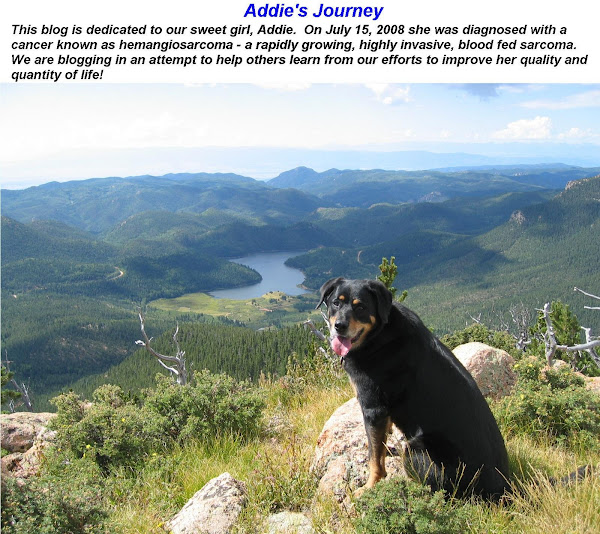This story was on Good Morning America this past weekend:
Click Here To View Video
In short, a veterinarian from Purdue University is traveling around the US doing research on rottweilers and what relationship there may be to them, old age, and avoiding cancer. Interesting at the end, they mention that they tested some deceased rotties and noticed that they actually had cancer and just "powered" through it.
It makes me wonder if that is why Addie is still with us.. she just won't accept the cancer and is just powering through it.
Tuesday, April 20, 2010
Monday, April 5, 2010
Another milestone

According to Dr. Friedly's office, Addie is currently his longest living hemangiosarcoma patient. Of course, we like to think that this is possible because of the utilization of Buck Mountain Botanical's Neoplasene and
 the other changes we have made to her diet. Regardless, we are quite happy that she is still with us and hope she continues to 'break the record'.
the other changes we have made to her diet. Regardless, we are quite happy that she is still with us and hope she continues to 'break the record'.Addie has even captured the attention of Dr. Fox at Buck Mountain due to his communication with Dr. Friedly.
We would like to say a big thank you to both doctors for their roles in Addie's treatment. Without either of them things would have surely been much different.
Addie and Finigan have both been scratching like crazy for the past several weeks. Actually, Finigan has beeen scratching and biting pretty much since the day we brought him home from the shelter. Initially, we thought it was a food allergy. We have tried several different types of food (including a vegetarian food) all with no success. Frustrated, we took Finigan to our traditional vet, Dr. Wasinger, and had a skin test performed to see if we could find any sort of an allergy issue. The results came back negative. So, the next most likely cause is an infestation of some sort. Fleas are easily ruled out (living at 9000 feet above sea level is not conducive to insects in general and there are zero signs of fleas on either dog). Microscopic mites, however, are a possibility.
Due to potential adverse reactions with Neoplasene we did not want to put Addie on the commonly prescribed drug for dealing with these types of parasites, selamectin (sold as Revolution). Because of this, Dr. Wasinger consulted with Dr. Friedly and it was decided to use another Buck Mountain product. This product is a dust that gets applied to the skin three times over three weeks. We are on the second treatment and there does not seem to be any change. Hopefully things will improve after the next treatment.
We have gone to great lengths to fix this problem (including installing a high cost furnace filter, hiring a company to clean and sanitize the duct work in the house, and treating the carpets with a mite killing powder). So far to no avail. If anyone has had experience with this type of problem we would love to hear from you.
On another note, we have noticed for the past year or two that Addies' eyes are becoming increasingly cloudy. After doing some research we found a product that has shown some success with canine cataracts. It is basically a drop that contains N-Acetyl Carnosine which is a naturally occurring di-peptide. This naturally occurring substance has shown promise in causing cataract tissue to dissolve and thereby clear up vision of the affected patient without surgery. (This product has also been used on humans with the same positive results). We are about one month into this regimen. The only drawback to using these drops is that it can take 3-6 months for improvement. We hope it will make a positive difference for Addie. Her hearing is not that great anymore so we would like to help keep her vision as sharp as possible.
She still loves chasing her tennis balls around and has taught Finigan the finer aspects of fetching along the way. It's great to see both of them playing together. Once the weather warms up a bit we will be able to get them outside more to help alleviate their winter boredom.
Subscribe to:
Posts (Atom)
